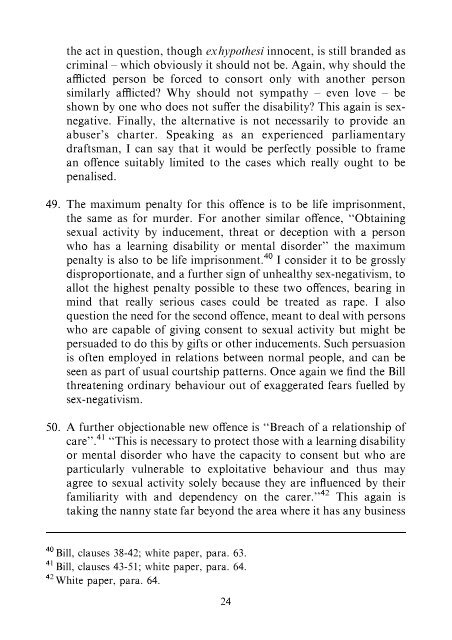2003.001 Sexual Ethics and Criminal Law, Lester ... - Francis Bennion
2003.001 Sexual Ethics and Criminal Law, Lester ... - Francis Bennion
2003.001 Sexual Ethics and Criminal Law, Lester ... - Francis Bennion
You also want an ePaper? Increase the reach of your titles
YUMPU automatically turns print PDFs into web optimized ePapers that Google loves.
act in question, though exhypothesi innocent, is still br<strong>and</strong>ed as<br />
the<br />
± which obviously it should not be. Again, why should the<br />
criminal<br />
person be forced to consort only with another person<br />
a‚icted<br />
a‚icted? Why should not sympathy ± even love ± be<br />
similarly<br />
by one who does not su€er the disability? This again is sexnegative.<br />
shown<br />
Finally, the alternative is not necessarily to provide an<br />
charter. Speaking as an experienced parliamentary<br />
abuser's<br />
I can say that it would be perfectly possible to frame<br />
draftsman,<br />
o€ence suitably limited to the cases which really ought to be<br />
an<br />
penalised.<br />
The maximum penalty for this o€ence is to be life imprisonment,<br />
49.<br />
same as for murder. For another similar o€ence, ``Obtaining<br />
the<br />
activity by inducement, threat or deception with a person<br />
sexual<br />
has a learning disability or mental disorder'' the maximum<br />
who<br />
is also to be life imprisonment. 40 I consider it to be grossly<br />
penalty<br />
<strong>and</strong> a further sign of unhealthy sex-negativism, to<br />
disproportionate,<br />
the highest penalty possible to these two o€ences, bearing in<br />
allot<br />
that really serious cases could be treated as rape. I also<br />
mind<br />
the need for the second o€ence, meant to deal with persons<br />
question<br />
are capable of giving consent to sexual activity but might be<br />
who<br />
to do this by gifts or other inducements. Such persuasion<br />
persuaded<br />
often employed in relations between normal people, <strong>and</strong> can be<br />
is<br />
as part of usual courtship patterns. Once again we ®nd the Bill<br />
seen<br />
ordinary behaviour out of exaggerated fears fuelled by<br />
threatening<br />
A further objectionable new o€ence is ``Breach of a relationship of<br />
50. 41 ``This is necessary to protect those with a learning disability<br />
care''.<br />
mental disorder who have the capacity to consent but who are<br />
or<br />
vulnerable to exploitative behaviour <strong>and</strong> thus may<br />
particularly<br />
to sexual activity solely because they are in¯uenced by their<br />
agree<br />
with <strong>and</strong> dependency on the carer.'' 42 This again is<br />
familiarity<br />
Bill, clauses 38-42; white paper, para. 63.<br />
40<br />
Bill, clauses 43-51; white paper, para. 64.<br />
41<br />
42 White paper, para. 64.<br />
sex-negativism.<br />
taking the nanny state far beyond the area where it has any business<br />
24

















